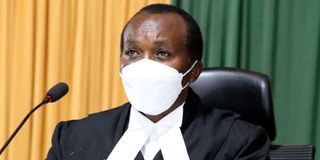No errors in BBI verdict, Appellate court says

Court of Appeal President Daniel Musinga delivers judgment on the Building Bridges Initiative Bill on August 20, 2021.
The Court of Appeal has clarified there were no errors in its judgment on the quashed proposal to amend the Constitution through the Building Bridges Initiative (BBI).
The court’s president Daniel Musinga stated there were no errors to be rectified in the final orders of the appellate court as sought by lawyer Morara Omoke.
Mr Omoke was one of the private citizens who opposed the planned amendments.
Justice Musinga explained there was no error in the final tally of the judges who voted on the question of whether the proposed BBI referendum was supposed to be an omnibus constitutional amendment Bill or a series of separate proposed amendments.
The BBI was a multi-subject constitutional amendment Bill with 74 proposed changes to statutes and the Constitution.
"I have been directed by Justice Musinga to inform you that there is no error in the final orders, and respectfully, no correction is necessary," reads the reply sent to the lawyer by Lorraine Ogombe, the deputy registrar of the Court of Appeal.
Mr Omoke had claimed there was confusion between the final dispositions of the court and the individual findings of the seven judges.
In his letter requesting for rectification of the orders, Mr Omoke had said his reading of the 1,089-page judgment revealed the opponents of the BBI Bill had won more than what was declared by the Court of Appeal in its final dispositions.
"Our reading of the judgment delivered by the Court of Appeal reveals the possibility of an error in the final tally of the judges of appeal who voted to overturn the findings of the High Court that: Article 257(10) of the Constitution of Kenya 2010 requires all the specific proposed amendments to the Constitution be submitted as separate and distinct referendum questions to the people," said Mr Omoke in his letter to Justice Musinga.
He stated the final orders issued by the appellate court indicated the High Court's finding on the issue was overturned after four judges found that it was not illegal to combine all the amendments proposed in the BBI into one single Bill.
Justices Roselyne Nambuye, Hannah Okwengu and Patrick Kiage had dissented and upheld the High Court’s decision, but being the minority, their decision could not hold.
Justices Musinga, Fatuma Sichale, Gatembu Kairu and Francis Tuiyott overruled the High Court's finding on the issue.
But Mr Omoke said he had noted that Justice Kairu did not overturn the findings of the High Court on this issue.
On the contrary, Mr Omoke said, Judge Kairu's analysis and findings upheld the decision of the High Court.
In his contention that there was an error in the final tally of judges' finding on the issue, Mr Omoke had referred the court's president to one of the paragraphs in the judgment where Justice Kairu stated that "I would qualify the declaration by the High Court that: Article 257(10) of the Constitution requires all the specific proposed amendments to the Constitution be submitted as separate and distinct referendum questions to the people by adding the words ‘subject to the nature of proposed amendment’".
According to Mr Omoke, Justice Kairu even enriched his judgment on the issue by stating that "what in my view Article 257(10) of the Constitution does not contemplate is the submission to the people in a referendum of an omnibus amendment Bill, a hotchpot of an amendment Bill, such as the Constitution Amendment Bill in this case."
The judge also said: "The argument that it would be impractical on account of logistical difficulties to formulate over 70 separate and distinct questions is perhaps more the reason that an omnibus amendment Bill should never be entertained.”
But after Justice Musinga’s reply, Mr Omoke yesterday said he would proceed with his appeal at the Supreme Court to challenge the finding of the appellate court that it was not illegal to combine all the amendments proposed in the BBI into one single Bill.
He argued that an omnibus Bill would violate election principles and the freedom and right to vote.
He wants the Supreme Court to declare that proposed referendum on multiple amendments to the Constitution cannot be submitted as a single question to voters.
Instead, he further contended, each proposed amendment should have its single and distinct question on the ballot paper.





